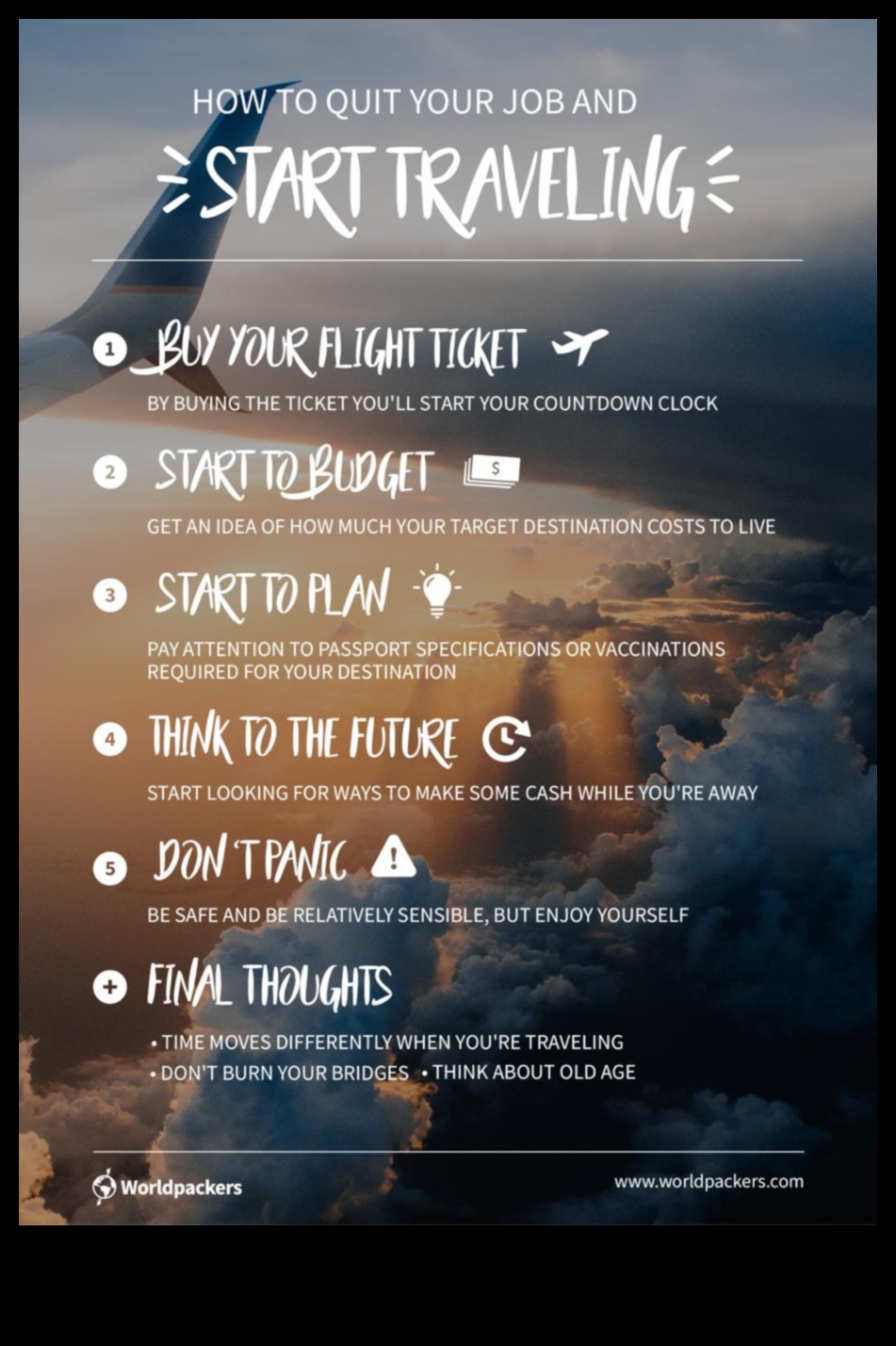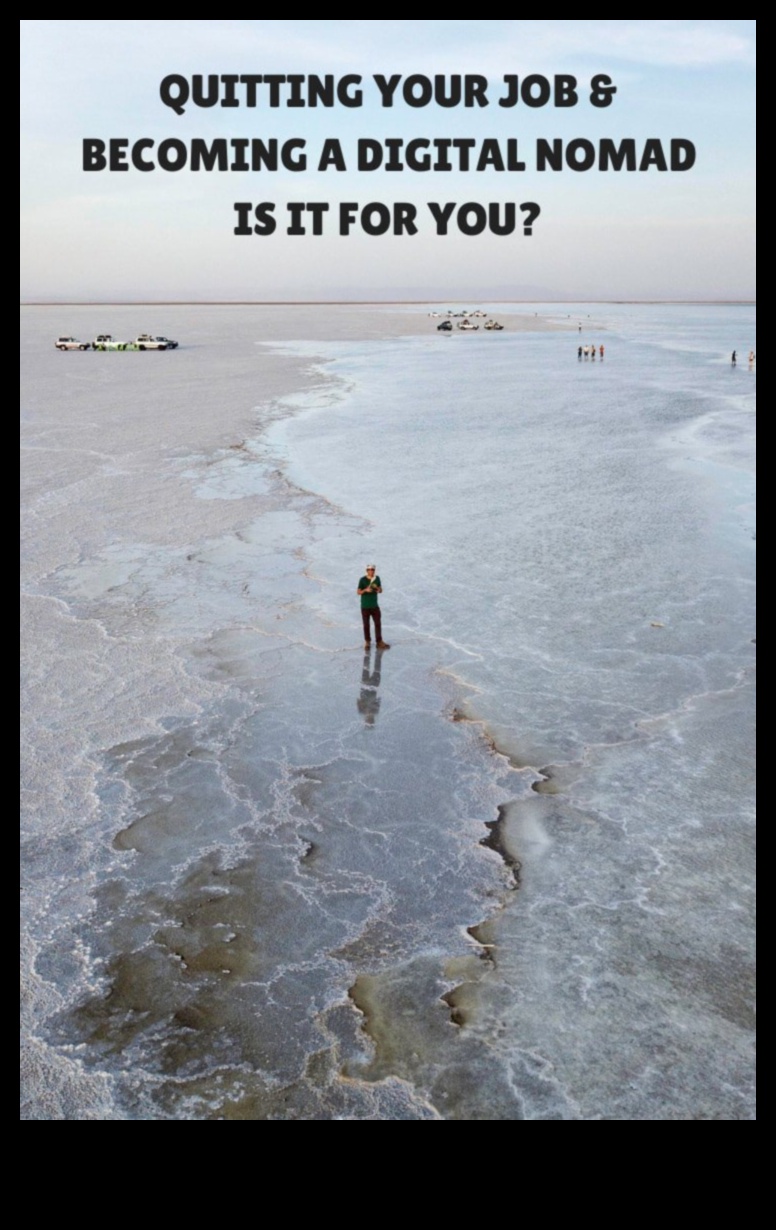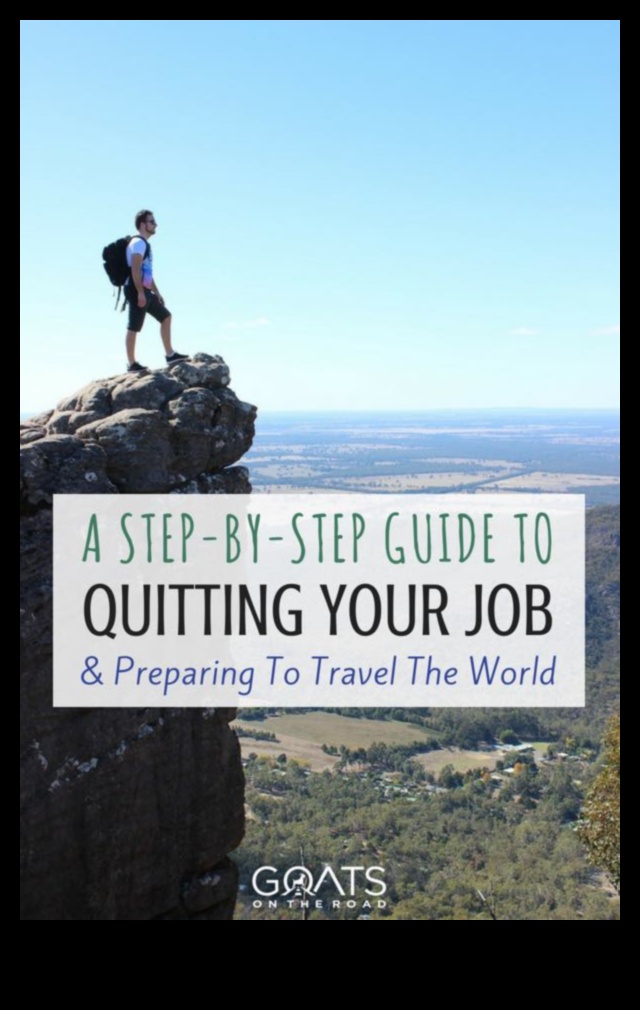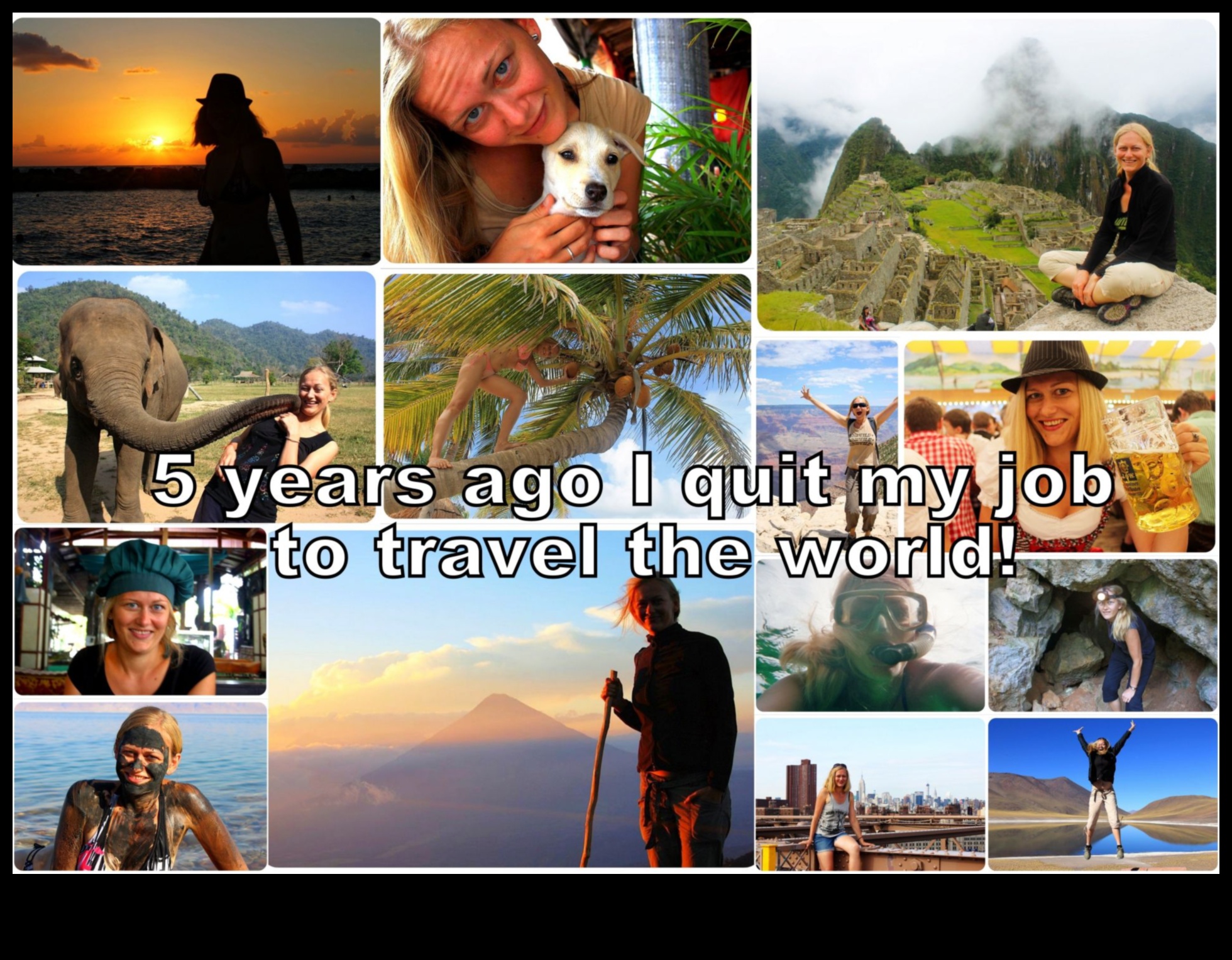
I. Introduction
II. The benefits of quitting your job and traveling the world
III. How to save money for your trip
IV. How to find a job that allows you to travel
V. How to plan your trip
VI. How to stay safe while traveling
VII. How to deal with culture shock
VIII. How to come home after your trip
IX. FAQ
X. Conclusion
| Topic | Answer |
|---|---|
| I. Introduction | This article will discuss the benefits of quitting your job and traveling the world, how to save money for your trip, how to find a job that allows you to travel, how to plan your trip, how to stay safe while traveling, how to deal with culture shock, how to come home after your trip, and FAQs. |
| II. The benefits of quitting your job and traveling the world | There are many benefits to quitting your job and traveling the world. These include: |
| III. How to save money for your trip | There are many ways to save money for your trip. These include: |
| IV. How to find a job that allows you to travel | There are many jobs that allow you to travel. These include: |

II. The benefits of quitting your job and traveling the world
There are many benefits to quitting your job and traveling the world. These include:
- Experiencing new cultures and meeting new people
- Learning about different ways of life
- Gaining a new perspective on the world
- Developing new skills
- Creating memories that will last a lifetime
If you are considering quitting your job to travel, it is important to weigh the benefits and drawbacks carefully. Make sure that you are prepared for the challenges of living and traveling on a budget. You should also have a plan for how you will support yourself while you are away.
If you are ready to take the plunge, quitting your job to travel can be an incredibly rewarding experience. It is a chance to see the world, meet new people, and learn about different cultures. It is also a chance to step outside of your comfort zone and grow as a person.
III. How to save money for your trip
There are many ways to save money for your trip, including:
- Cutting back on your expenses
- Getting a part-time job or starting a side hustle
- Using travel rewards credit cards
- Saving up for your trip over time
Here are some tips for cutting back on your expenses:
- Cook at home instead of eating out
- Bring your lunch to work instead of buying it
- Cancel unused subscriptions
- Shop around for the best deals
If you’re looking for a part-time job or a side hustle, there are many options available. You can work as a waiter, waitress, bartender, Uber driver, dog walker, or tutor. You can also start your own blog, sell handmade goods, or freelance online.
Travel rewards credit cards can be a great way to save money on your trip. Many cards offer sign-up bonuses that can be redeemed for free flights or hotel stays. You can also earn points or miles on every purchase you make, which you can then use to offset the cost of your trip.
If you’re not able to save up for your trip all at once, you can save up over time. Start by setting a goal for how much you want to save each month. Then, track your progress and make adjustments as needed.
By following these tips, you can save up enough money to travel the world and experience new cultures.
II. The benefits of quitting your job and traveling the world
There are many benefits to quitting your job and traveling the world. Some of the most common benefits include:
- Experiencing new cultures and meeting new people
- Learning about different ways of life
- Gaining a new perspective on the world
- Creating memories that will last a lifetime
- Developing new skills and talents
- Getting out of your comfort zone
- Recharging your batteries
- Pursuing your passions
If you’re thinking about quitting your job to travel, it’s important to weigh the benefits and challenges carefully. It’s also important to have a plan in place for how you’re going to fund your trip and what you’re going to do when you return home.

V. How to plan your trip
Once you have decided on your destination and budget, it is time to start planning your trip. Here are a few things to keep in mind:
- Do your research. Read travel guides, blogs, and articles to learn more about your destination. This will help you make informed decisions about where to go, what to see, and how to get around.
- Create a budget. It is important to set a budget for your trip so that you do not overspend. Make sure to factor in the cost of airfare, accommodation, food, transportation, and activities.
- Book your flights and accommodation in advance. This will help you get the best prices.
- Get your travel documents in order. This includes your passport, visa (if required), and any other necessary documents.
- Pack your bags. Make sure to pack everything you need for your trip, but be mindful of the weight of your luggage.
Once you have everything planned, you are ready to embark on your adventure!

VI. How to stay safe while traveling
When you’re traveling, it’s important to take steps to stay safe. Here are a few tips:
Be aware of your surroundings. Pay attention to where you are and who is around you. If you feel unsafe, trust your instincts and leave the area.
Travel with a buddy. It’s always safer to travel with someone else, especially if you’re going to be in a foreign country.
Stay in well-lit areas. Avoid walking alone in dark or deserted areas.
Be careful about what you drink. Don’t accept drinks from strangers, and be aware of the alcohol content of your drinks.
Be aware of your belongings. Keep your valuables close to you and don’t leave them unattended.
Use common sense. Don’t do anything that would put you in danger.
By following these tips, you can help to stay safe while traveling.

VII. How to deal with culture shock
Culture shock is a common experience for people who travel to new countries or cultures. It can be caused by a variety of factors, including the unfamiliar language, customs, and values. Culture shock can range from mild to severe, and it can have a significant impact on your physical and mental health.
There are a number of things you can do to help deal with culture shock. These include:
- Educate yourself about the culture you are visiting.
- Be open to new experiences.
- Don’t be afraid to ask for help.
- Take breaks from your travels if you need to.
If you are experiencing severe culture shock, it is important to seek professional help. A therapist can help you to understand and cope with your feelings, and develop strategies for managing culture shock.
How to come home after your trip
Coming home after a long trip can be challenging. You may be feeling jet lag, culture shock, and homesickness. It can also be difficult to adjust to your old routine and responsibilities. Here are some tips for making the transition back to home life a little easier:
- Take some time to relax and decompress. Don’t try to jump back into your old routine right away. Give yourself some time to adjust to being home.
- Reconnect with your friends and family. Spend time with the people you missed while you were away.
- Update your social media accounts and let your friends and family know that you’re back.
- Start planning your next trip. This will help you keep the wanderlust alive and give you something to look forward to.
Coming home after a long trip can be a difficult experience, but it’s also an opportunity to reflect on your experiences and grow as a person. By taking some time to relax and adjust to your new surroundings, you can make the transition back to home life a little easier.
FAQ
Q: What are the benefits of quitting your job and traveling the world?
A: There are many benefits to quitting your job and traveling the world. Some of the benefits include:
- Experiencing new cultures and meeting new people
- Learning about different ways of life
- Gaining a new perspective on the world
- Developing new skills and talents
- Creating memories that will last a lifetime
Q: What are the financial implications of quitting your job to travel?
A: The financial implications of quitting your job to travel will vary depending on your individual circumstances. However, there are a few things you can do to minimize the financial impact of your decision.
- Save up as much money as possible before you quit your job
- Consider getting a part-time job or freelancing while you travel
- Find ways to travel cheaply, such as couchsurfing, camping, and cooking your own meals
Q: How do I find a job that allows me to travel?
A: There are a number of ways to find a job that allows you to travel. Some of the best options include:
- Teaching English abroad
- Working as a tour guide
- Working on a cruise ship
- Working as a flight attendant
- Starting your own online business
Q: How do I plan my trip?
A: Planning your trip is an important part of making sure you have a successful experience. Here are a few things to keep in mind when planning your trip:
- Set a budget
- Choose your destinations
- Book your flights and accommodation
- Get your travel documents
- Create an itinerary
Q: How do I stay safe while traveling?
A: There are a number of things you can do to stay safe while traveling. Some of the best tips include:
- Be aware of your surroundings
- Don’t travel alone at night
- Keep your valuables close to you
- Learn about the local culture and customs
- Get travel insurance
Q: How do I deal with culture shock?
Culture shock is a common experience for travelers. Here are a few tips for dealing with culture shock:
- Be patient with yourself
- Learn about the local culture
- Make an effort to interact with locals
- Find a support group
- Give yourself time to adjust
Q: How do I come home after my trip?
Coming home after a long trip can be a difficult experience. Here are a few tips for making the transition back to home easier:
- Take some time to relax
- Reconnect with your friends and family
- Adjust to your new routine
- Set some goals for yourself
- Be patient with yourself
FAQ
Q: What are the benefits of quitting your job and traveling the world?
A: There are many benefits to quitting your job and traveling the world. Some of the benefits include:
- Experiencing new cultures and meeting new people
- Learning about different ways of life
- Gaining a new perspective on the world
- Developing new skills and talents
- Creating memories that will last a lifetime
Q: How much money do I need to save to travel the world?
A: The amount of money you need to save to travel the world will vary depending on your budget and travel style. However, a good rule of thumb is to save at least $10,000 for a one-year trip.
Q: How can I find a job that allows me to travel?
A: There are many different ways to find a job that allows you to travel. Some of the most popular options include:
- Teaching English abroad
- Working as a tour guide
- Working as a flight attendant
- Working as a cruise ship employee
- Working as a digital nomad

How to Quit Your Job and Travel
This article will provide you with information on how to quit your job and travel the world. We will cover the pros and cons of quitting your job to travel, how to plan your travel budget, how to find jobs while traveling, how to stay safe while traveling, how to deal with culture shock, how to reintegrate back into society after traveling, and FAQs about quitting your job to travel.

The Pros and Cons of Quitting Your Job to Travel
There are many pros and cons to consider before quitting your job to travel. Some of the pros include:
- You can experience new cultures and meet new people.
- You can learn about different ways of life.
- You can challenge yourself and grow as a person.
- You can create memories that will last a lifetime.
Some of the cons include:
- You may have to give up a steady income.
- You may have to find a new job when you return home.
- You may experience culture shock.
- You may miss your family and friends.
It is important to weigh the pros and cons carefully before making a decision about whether or not to quit your job to travel.
How to Plan Your Travel Budget
One of the most important things to do before quitting your job to travel is to plan your budget. This will help you to make sure that you have enough money to cover your expenses while you are away.
There are a few different ways to estimate your travel budget. You can use a travel budget calculator, or you can create your own budget based on your specific needs.
When creating your budget, be sure to include the following expenses:
- Airfare
- Accommodation
- Food
- Transportation
- Activities
- Travel insurance
It is also important to have a contingency fund in case of unexpected expenses.

How to Find Jobs While Traveling
There are a number of ways to find jobs while traveling. Some of the most popular options include:
- Teaching English
- Working in a hostel or bar
- Volunteering
- Freelancing
- Starting your own business
The best way to find a job while traveling is to do your research before you go. This means researching the different countries you want to visit and the types of jobs that are available.
You can also find jobs while you are traveling by using online job boards, talking to locals, and networking with other travelers.

How to Stay Safe While Traveling
It is important to take precautions to stay safe while traveling. Some of the things you can do to stay safe include:
- Be aware of your surroundings.
- Don’t travel alone at night.
- Keep your valuables close to you.
- Be careful of scams.
- Get travel insurance.
For more information on how to stay safe while traveling, you can visit the website of the United States Department of State.

How to Deal with Culture Shock
Culture shock is a common experience for people who travel to new countries. It can be caused by the unfamiliar language, customs, and way of life.
There are a number of things you can do to deal with culture shock. Some of the things you can do include:
- Be patient with yourself.
- Learn about the local culture.
- Make friends with locals.
- Join a support group.
For
| LSI Keyword | Answer |
|---|---|
| 1. travel the world | How to travel the world on a budget |
| 2. quit your job | The pros and cons of quitting your job to travel |
| 3. travel blogging | How to start a travel blog |
| 4. digital nomad | How to become a digital nomad |
| 5. location independence | How to live a location-independent lifestyle |
II. The Pros and Cons of Quitting Your Job to Travel
There are many pros and cons to quitting your job to travel. It is important to weigh these carefully before making a decision.
Some of the pros of quitting your job to travel include:
- You can experience new cultures and meet new people.
- You can learn about different ways of life.
- You can get a new perspective on the world.
- You can challenge yourself and grow as a person.
- You can create memories that will last a lifetime.
Some of the cons of quitting your job to travel include:
- You may have to give up a steady income.
- You may have to live on a tight budget.
- You may have to deal with culture shock.
- You may have to miss out on important events at home.
- You may have to find a new job when you return home.
Ultimately, the decision of whether or not to quit your job to travel is a personal one. There is no right or wrong answer. The best decision for you will depend on your individual circumstances and goals.
III. How to Plan Your Travel Budget
Planning your travel budget is one of the most important steps in making your dream of quitting your job to travel a reality. It’s important to be realistic about how much money you’ll need to spend on travel, and to create a budget that will allow you to enjoy your trip without going into debt.
There are a few things to keep in mind when planning your travel budget. First, you’ll need to factor in the cost of airfare, transportation, food, accommodation, and activities. You’ll also need to consider the cost of visas and insurance.
Once you have a general idea of how much money you’ll need, you can start to create a more detailed budget. Be sure to include a buffer for unexpected expenses.
Here are a few tips for planning your travel budget:
- Set a goal for how much you want to spend on your trip.
- Do your research and find out how much things cost in the destinations you’re visiting.
- Consider staying in hostels or budget hotels to save money on accommodation.
- Cook your own meals or eat at local restaurants to save money on food.
- Look for free or low-cost activities to do in your destinations.
- Save up for your trip over time so that you can spread out the cost.
By following these tips, you can create a travel budget that will allow you to enjoy your trip without breaking the bank.
IV. How to Find Jobs While Traveling
There are a number of ways to find jobs while traveling, including:
- Teaching English
- Working in a hostel or bar
- Volunteering
- Freelancing
- Starting your own business
Each of these options has its own advantages and disadvantages, so it’s important to do your research and choose the one that’s right for you.
Here is a more detailed look at each of these options:
Teaching English
Teaching English is one of the most popular ways to find work while traveling. There are a number of different organizations that hire English teachers, including:
- The British Council
- The International House
- The Peace Corps
- Babbel
- iTalki
To qualify to teach English, you will need a TEFL or TESOL certificate. These certificates can be obtained online or through a variety of in-person courses.
Teaching English can be a great way to travel and earn money at the same time. However, it’s important to be aware of the challenges that come with this type of work. For example, you may have to work long hours and deal with difficult students.
Working in a Hostel or Bar
Working in a hostel or bar is another popular way to find work while traveling. These types of jobs are often easy to find and don’t require any special qualifications. However, the pay is usually low and the hours can be long.
If you’re looking for a job that will allow you to meet new people and have a lot of fun, working in a hostel or bar could be a great option for you. However, it’s important to be aware of the challenges that come with this type of work. For example, you may have to work nights and weekends, and you may have to deal with drunk customers.
Volunteering
Volunteering is another great way to find work while traveling. There are a number of different organizations that offer volunteer opportunities, including:
- The Peace Corps
- WWOOF
- AIESEC
- Internations
- Idealist
Volunteering can be a great way to give back to the community and learn about a new culture. However, it’s important to be aware of the challenges that come with this type of work. For example, you may have to work long hours and live in difficult conditions.
Freelancing
Freelancing is another great way to find work while traveling. There are a number of different ways to freelance, including:
- Writing
- Design
- Marketing
- Programming
- Consulting
To get started freelancing, you will need to create a portfolio of your work and start pitching your services to potential clients. Freelancing can be a great way to earn money while traveling, but it’s important to be aware of the challenges that come with this type of work. For example, you may have to deal with inconsistent income and long hours.
Starting your own business
Starting your own business is another great way to find work while traveling. There are a number of different businesses that you can start, including:
- An online store
- A blog
- A digital product
- A service-based business
- A franchise
To start your own business, you will need to do your research and create a business plan. Starting a business can be a great way to earn money while traveling, but it’s important to be aware
V. How to Stay Safe While Traveling
Traveling can be a wonderful experience, but it’s important to stay safe while you’re on the road. Here are a few tips to help you stay safe while traveling:
- Be aware of your surroundings. Keep an eye on your belongings and be aware of your surroundings, especially at night.
- Travel with a friend or group. Traveling with a friend or group can help you stay safe, especially if you’re traveling in a foreign country.
- Use common sense. Don’t accept drinks from strangers, don’t walk alone at night, and be aware of your surroundings.
- Stay up-to-date on travel advisories. Before you travel, check the U.S. State Department’s website for travel advisories for the countries you’re planning to visit.
- Get travel insurance. Travel insurance can help you cover medical expenses, lost luggage, and other unexpected costs.
By following these tips, you can help stay safe while traveling and enjoy your trip to the fullest.
VI. How to Deal with Culture Shock
Culture shock is a common experience for people who travel to new countries or cultures. It can be caused by a variety of factors, including language barriers, different customs and values, and unfamiliar food. Culture shock can range from mild to severe, and it can affect both your physical and mental health.
Here are some tips for dealing with culture shock:
- Be patient with yourself. It takes time to adjust to a new culture.
- Learn about the local culture. This will help you to understand why people do things differently.
- Be open to new experiences. Try new foods, meet new people, and explore new places.
- Don’t be afraid to ask for help. If you’re feeling overwhelmed, talk to a friend, family member, or therapist.
Culture shock is a temporary condition. With time and patience, you will adjust to your new surroundings and learn to thrive in a new culture.
VII. How to Reintegrate Back into Society After Traveling
After an extended period of travel, it can be difficult to reintegrate back into society. You may have to adjust to a new routine, find a new job, and reconnect with friends and family. Here are a few tips for making the transition back to home easier:
- Take some time to relax and adjust to your new surroundings.
- Start by reconnecting with the people who are important to you.
- Update your resume and start looking for a job.
- Set realistic goals for yourself and take things one step at a time.
- Be patient with yourself and don’t expect to adjust overnight.
Reintegrating back into society after traveling can be a challenge, but it is also an opportunity to grow and learn. By taking things slowly and setting realistic goals, you can make the transition easier and enjoy all that your new life has to offer.
FAQs About Quitting Your Job to Travel
Here are some common FAQs about quitting your job to travel:
-
What are the pros and cons of quitting your job to travel?
-
How much money do I need to save up to quit my job and travel?
-
How do I find a job while traveling?
-
How do I stay safe while traveling?
-
How do I deal with culture shock?
-
How do I reintegrate back into society after traveling?
For more information on these topics, please see the following resources:
IX. Resources for Quitting Your Job to Travel
Here are some resources that you may find helpful in your journey to quitting your job and traveling the world:
- The Broke Backpacker: This website is a great resource for budget travel tips and advice.
- Nomadic Matt: This blog is another great resource for travel tips and advice from a seasoned traveler.
- How to Quit Your Job and Travel the World: This article from Traveller magazine provides some practical advice on how to make the transition from working to traveling.
- Workaway: This website allows you to find volunteer opportunities in exchange for room and board. It’s a great way to travel and save money at the same time.
- HelpX: This website is similar to Workaway, but it offers more paid opportunities.
- Couchsurfing: This website allows you to stay with locals for free in exchange for some company and conversation. It’s a great way to meet new people and learn about different cultures.
These are just a few of the many resources that are available to help you quit your job and travel the world. With a little planning and determination, you can make your dream of travel a reality.
How to Quit Your Job and Travel
FAQs About Quitting Your Job to Travel
Q: What are the pros and cons of quitting your job to travel?
A: There are many pros and cons to quitting your job to travel. Some of the pros include being able to see the world, experience new cultures, and meet new people. You will also have the opportunity to learn new skills and grow as a person. However, there are also some cons to consider, such as the financial challenges, the difficulty of finding a job when you return home, and the potential for culture shock.
Q: How do I plan my travel budget?
A: When planning your travel budget, it is important to consider the following factors: the cost of airfare, accommodation, food, transportation, and activities. You will also need to factor in the cost of visas and insurance. Once you have a good idea of your budget, you can start to plan your trip.
Q: How do I find jobs while traveling?
There are a number of ways to find jobs while traveling. You can search online job boards, contact travel agencies or tour operators, or look for work on a volunteer basis. You can also find work by networking with other travelers or by asking around at local businesses.